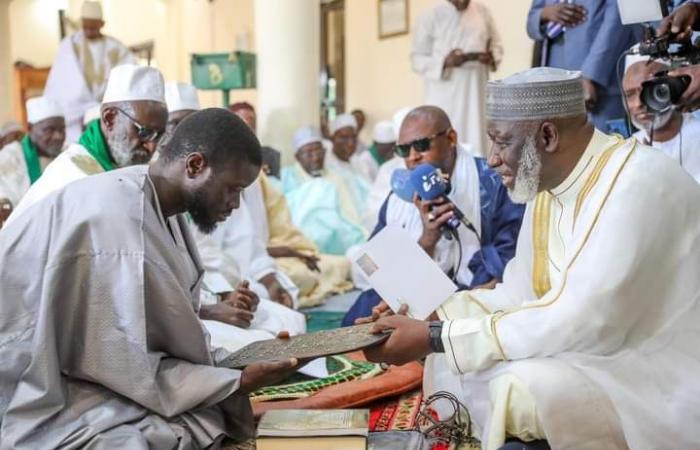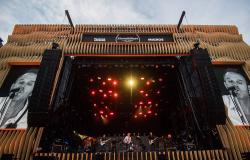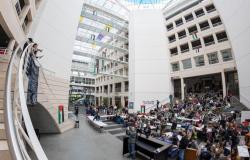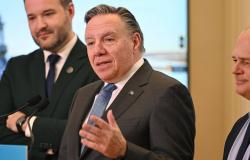The new head of state’s contact with the Omarian family, via yesterday’s Friday prayer, as well as his first official visit to the major religious cities of Touba and Tivaouane are not new in Senegal. More than a simple pious “ziar” visit, it is a quest for blessing which is part of a political ritual in Senegal, a custom respected since the dawn of the country’s independence. The Presidents of the Republic who have succeeded one another at the head of the country have, each in their own way, given a quasi-republican character to this approach. Relations with Muslim religious brotherhoods and the Catholic clergy were all marked by the seal of good understanding and interdependence between the political and religious spheres. With the backdrop of the search for this anointing and this “baraka” in the conduct of state affairs.
Allegiance, blessing or simple desire to benefit from baraka? The pious visit or Ziar of the brand new President of the Republic Bassirou Diomaye Faye to the various religious homes, widely broadcast in the public and religious space, was variously appreciated. Far from being a novelty, it is part of a well-established tradition. The successor of President Macky Sall, Bassirou Diomaye Faye, seems to remain in the wake of the Presidents of the Republic who have succeeded one another at the head of the country who have traced leaving a touch in their relations with the different religious families. A relationship that goes even further since it has its Source in the colonial period and the political battles involving major Senegalese figures.
It was not uncommon for a leader to be dubbed by the great leaders of the brotherhoods of the time. Every politician of the time hoped to obtain religious blessing and this grace from the faithful or simply the voters. Going back through the history of Senegal, we can note that this interdependence of the political and religious spheres at the very beginning of the last century explains in many respects the type of relationship, the power and the influence of religion in the political and administrative sphere.
Historian Mamadou Diouf in an interview done in 2014 describes the Senegalese political system and the role of religious leaders in this system: “Religious leaders have always played a role in Senegalese political life. This is how our political system works. Marabouts have been an integral part of our political system since the colonial period. And our political system has always been a combination of logics of often contradictory interests”.
Between the two world wars, the religious people of the time occupied a central place in political life. We can note it under Blaise Diagne, Galandou Diouf, political figures of this era who were able to benefit from significant support and the support of caliphs and guides like Cheikh Mouhamadou Moustapha Mbacké, Cheikh Anta Mbacké, Seydina Issa Laye or even Seydou Nourou Tall to capture the masses of a population who are mostly of brotherhood persuasion. This collaboration will manifest itself after the country’s independence in 1960. Léopold Sédar Senghor, first president of Senegal, was part of this continuity by giving religious leaders the status of intermediaries between political society and citizens. We remember the role already played in 1968 by the leaders of the brotherhoods in easing political tensions, which eloquently reflects the relations with religious families in Senegal which have marked the magisterium of the various presidents, from Senghor to Abdou Diouf, in passing through Abdoulaye Wade and Macky Sall..
Support and friendship, assets for the first president
Although belonging to the Catholic community of Senegal, the president-poet, Léopold Sédar Senghor, was able to establish in 1967, deep relations of friendship coupled with unwavering support with the Caliph General of the Mourides, El Hadji Serigne Falilou Mbacké , also the second caliph of the founder of Mouridism. As he had ensured from the major legislative elections of 1951 the support of Khalifa Ababacar Sy, Caliph General of the Tidjanes, against his opponent Lamine Guèye. Father Joseph Roger De Benoist recounts in one of his books that “unfailing friendship”born between them, in 1945, “was materialized, on the one hand, by continuous and unreserved support, on the other by a policy of aid and assistance on the part of President Senghor addressed to the Caliph General of the Mourides and the entire Mouride community. The government still needed intermediaries. The marabouts retained their position as during the period of colonialism and most of the time served as relays for State action.
Abdou Diouf, under the seal of neutrality
The relations between the former President of the Republic, Abdou Diouf and the Caliph General of the Mourides, Serigne Abdoul Ahat Mbacké, will be further illustrative of this. The second president of Senegal will, however, maintain a certain equidistance from this brotherhood. In an interview given to RFI, former president Abdou Diouf demonstrated the support of this religious guide whom he considered to be a ” father “. Abdou Diouf, in 1988, was the first president to have benefited from a religious voting instruction, a resounding “ndigël” from the Caliph General of the Mourides.
Abdoulaye Wade, talibé president
Me Abdoulaye Wade, third president of Senegal, particularly distinguished himself in his relations with the religious brotherhoods of Senegal. Unlike his predecessors who displayed a certain neutrality towards religious brotherhoods, the third head of state of Senegal had not him wasted no time in giving another twist to this tradition. His relationship with the fifth Caliph General of the Mourides, Serigne Saliou Mbacké, was a clear example of this. During his first visits to the religious city of Touba, the entire Republic traveled there. During his Khalifat, Serigne Saliou Mbacké, however, displayed his neutrality in the political game. It was under his Khalifat that the major modernization works of the religious city were launched.
Macky Sall relaunches the perfect understanding
The outgoing President of the Republic, Macky Sall, will not deviate from this tradition, despite a strong signal that he issued during the period between the two rounds of the 2012 Presidential election consisting of restricting the place of religious people and treating them as any citizen, once President of the Republic. “Religious people will not have any special status”, he had suggested. This part of a sentence resonated in the public space and even aroused the anger of many religious men. President Macky Sall will, however, be forced to re-clarify his thoughts. His years of governance will be marked by more than well-oiled relationships. Through numerous visits, President Sall will sufficiently demonstrate his perfect understanding, not to say collusion, with the General Caliphs of all the major religious centers of Touba, Tivaouane, Cambérène, Kaolack, Ndiassane, Medina Gounass, etc. This agreement will be materialized by the ambitious program of renovation of religious cities implemented during his magisterium.
Omar DIAW






